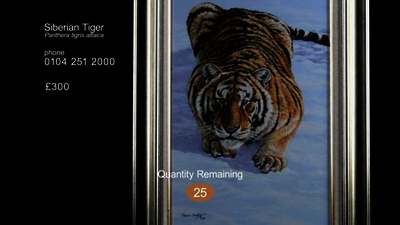Billingham, Richard 
![Video for TV broadcast and online formats [thumbnail of Video for TV broadcast and online formats]](https://eprints.glos.ac.uk/6833/1.hassmallThumbnailVersion/Siberian%20Tiger%2C%20video%2C%203mins%2C%20Richard%20Billingham%20film%20still.jpg)  Preview |
Image (Video for TV broadcast and online formats)
Siberian Tiger, video, 3mins, Richard Billingham film still.jpg - Published Version Available under License Creative Commons Attribution Non-commercial 2.0. Download (32kB) | Preview |
Abstract
Siberian Tiger is a satirical video piece by artist Richard Billingham about consumption and the demise of the Siberian Tiger of which there are about 400 remaining in the wild. It was commissioned by Jacqui Davies (who was also the producer) and FACT in association with Arts Council England for Random Acts (Channel 4's strand of artist-led three-minute films). It was part of a series of 25 broadcast commissions intended as artworks for TV / TV interventions. All of the artists involved in Random Acts have an interest in television as subject or context. Artists were invited to make works that “embody, expand or reflect on the medium, subverting and challenging its aesthetics and politics.” Siberian Tiger was broadcast on Channel 4 on 9th November 2012. It was also conceived to be watched online. The intention was to make a piece of work with an environmental message but at the same time would be engaging and compelling. Siberian Tiger uses the monologue or voice over of a professional actor and adopts the same type of format as Shopping Channel TV, a format that is deliberately compelling to engage viewers and ‘draw them in’ with a view selling a product. The video was produced from a number of digital photographs of a painting of a tiger by the artist/painter Stephen Gayford. The images of the painting were put into the application ‘After Effects” and made into a ‘slick’ moving image, complete with pans and zooms. Inspiration for the work also came from John Berger's essay, 'Why We Look at Animals', in particular the issues he raised about the human consumption of Nature and our subsequent estrangement from the natural world. As the overall number and diversity of animals has declined and as our everyday contact with animals has also declined, the number of images of animals in capitalist Western society has increased. Siberian Tiger is also satirical of the art market, in the way in which prints are sold in limited editions to make them more unique, desirable and expensive. Besides broadcast, Siberian Tiger has also been screened at FACT (as part of the Liverpool Biennial 2012); Rome Festival, 2012; Glasgow Film Festival 2013 and Kino der Kunst, Munich 2013.
| Item Type: | Film / Video |
|---|---|
| Subjects: | N Fine Arts > N Visual arts (General) For photography, see TR |
| Divisions: | Schools and Research Institutes > School of Arts, Culture and Environment |
| Research Priority Areas: | Creative Practice and Theory |
| Depositing User: | Richard Billingham |
| Date Deposited: | 10 May 2019 14:33 |
| Last Modified: | 05 Aug 2025 09:46 |
| URI: | https://eprints.glos.ac.uk/id/eprint/6833 |
University Staff: Request a correction | Repository Editors: Update this record

 Tools
Tools Tools
Tools